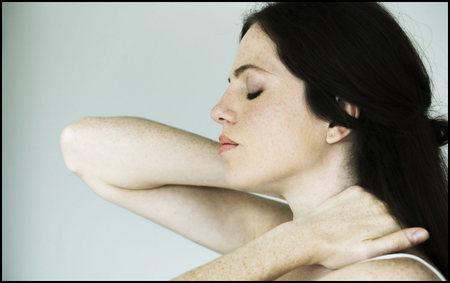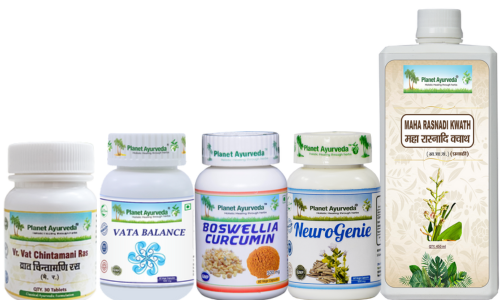AYURVEDIC TREATMENT & HERBAL REMEDIES FOR ALLODYNIA
ABSTRACT
Allodynia is a rare pain caused by things that normally do not cause pain, such as touching a sheet, the seam of a sock, or the heat of freshly baked bread. Allodynia is not life-threatening, but it can cause problems in daily life. It can also cause anxiety and other psychological problems. Advice for people with allodynia varies depending on the severity of symptoms and underlying conditions such as diabetes or migraines. Allodynia and hyperalgesia are two different terms, but both are types of neuropathic pain. Allodynia occurs in approximately 15-20% of people with neuralgia. So we will discuss Allodynia causes, symptoms, types, risk factors, diagnosis, modern treatment, herbal remedies by Planet Ayurveda and lifestyle tips.

INTRODUCTION
Allodynia is a type of neuropathic pain (neuralgia). Individuals with allodynia are very delicate to contact. Things that don’t normally cause pain can be extremely painful. These actions might incorporate remaining cool, brushing your hair, or wearing cotton Shirts. Many circumstances can cause allodynia. Normal reasons for allodynia incorporate diabetes, shingles, fibromyalgia, and migraines.
CAUSES OF ALLODYNIA
There are the following causes of allodynia:
- Diabetes
- Migraine headaches
- Multiple sclerosis
- Trigeminal neuralgia
- Shingles
- Chickenpox
- Trauma
- Chemotherapy
SYMPTOMS OF ALLODYNIA
- Nausea
- Anxiety
- Fatigue
- Severe headache
- Difficulty in sleeping
- Depression
- Vision changes
TYPES OF ALLODYNIA
- Thermal Allodynia: Pain occurs from changes in skin temperature. For example, putting a couple of drops of cold water on the skin will hurt.
- Dynamic or mechanical Allodynia: Movements– for example, pulling a light thing over the skin can be painful.
- Static or tactile Allodynia: Light contact can cause pain such as tapping the shoulder, causing pain.
RISK FACTORS
- Migraine
- Multiple sclerosis
- Fibromyalgia
- Peripheral neuropathy
- Shingles
- Excessive alcohol intake
- Very low levels of vitamin D or B
- Opioids and chemotherapy drugs
- Stress
- Diabetic neuropathy
- Stroke
- Trauma
DIAGNOSIS
- Physical examination
- Medical history
- Blood and urine tests
- MRI
- CT scan
- EMG (Electromyogram)
- NCS (Nerve conduction study)
- For the evaluation of nerve damage, QST (Quantitative sensory testing) is done
TREATMENT
There is no specific treatment for Allodynia but doctors can give you treatment to reduce the pain.
- Local anaesthetics
- Antidepressants
- Anticonvulsants
- Cognitive behavioral therapy
- Mindfulness practices
- Acupuncture
- NSAIDs
- Lifestyle changes
LIFESTYLE CHOICES
- Follow healthy diet
- Quit smoking
- Getting enough sleep
- Light exercises
- Manage your stress
- Maintaining a healthy weight
- Vaccinated yourself timely
AYURVEDIC OVERVIEW OF ALLODYNIA
In Ayurveda, we can associate allodynia with Vatavyadhi. Vata is responsible for the functioning of the nervous system. All functions of Kapha, Pitta, Dhatu and Mala are dependent on Vata dosha. Vata abnormalities can cause many problems in the body, leading to many diseases. It also affects the body’s strength, appearance, health and longevity. With the effect of Vata dosha, stress can cause neurological diseases such as paralysis, Parkinson’s disease, depression, anxiety, etc. Vata dosha can be affected by many factors, such as poor diet or lifestyle.
VATA VYADHI
What is Vata vyadhi?
विकृत वात जनितो असाधारणो व्याधिः वातव्याधिः। (मा. नि. २२)
When an asaadhaarna vyadhi (uncommon and special disease) is caused by vitiated Vata dosha, it is called Vata vyadhi.
CAUSATIVE FACTORS OF VATA VYADHI
According to Acharya Sushruta, there are the following causative factors of Vata vyadhi:
अत ऊर्ध्वं प्रकोपणानि वक्ष्यामः——————–प्रकोपमापद्यते।। (सु. सू. २१/१९)
- Poor fighting strength
- Performing heavy exercises
- Indulging in more sexual acts
- Continuous study
- Falling down from a certain height
- Excessive strain on the body
- Running or speed walking
- Injury due to fighting
- Swimming in water
- Dry meat
- Carrying heavy loads
- Excessive travelling on elephants, horses, chariots, and by foot
- Eating during indigestion
- Not sleeping during the night
- Increased intake of bitter, astringent, pungent, rough, light, cold, and dried vegetables
SAMPRAPTI (PATHOGENESIS) OF VATA VYADHI
देहे स्रोतांसि रिक्तानि पूरयित्वा अनिलो वली।
करोति विविधान व्याधीन सर्व अङ्ग एक अङ्ग संश्रयान।। (च. चि. २८)
Vata dosha is aggravated by the above causative factors, causing occupied empty transport channels (strotasa). Vata disrupted while filling the empty spaces causes various diseases that can affect the sarvanga (whole body) or ekanga (limited to certain areas), that is Vata vyadhi.
LAKSHANA OF VATA VRIDHI (INCREASE IN VATA)
वातवृद्धौ वाकपारुष्यं कार्श्यं काष्णर्यं गात्रस्फुरणकामिता निद्रानाशोाल्पबलत्वं गाढवर्चस्त्वं च। (सु. सू. १५/१८)
- Emaciation
- Tremors
- Lack of sleep
- Throbbing sensation in parts of the body
- Loss of consciousness
- Blackish discolouration
- Desire to warmth
- Convulsions
- Decrease in strength
- Hard stools
- Pulsation
- Pricking pain
- Discomfort
LAKSHANA OF VATA KSHAYA (DECREASE OF VATA)
तत्र, वातक्षये मंदचेष्टाअल्पवाक्त्वमप्रहर्षो मूढ़संज्ञता च । (सु. सू. १५/११ )
- Diminished activities
- Loss of speech
- Lack of excitation
- Diminished mental faculties
PANCHKARMA TREATMENT
- Snehana
- Swedana
- Deepana Pachana drugs
- Abhyanga
- Mridu virechana
HERBAL REMEDIES FOR ALLODYNIA BY PLANET AYURVEDA
Planet Ayurveda offers various herbal remedies to treat various ailments related to the human body. All products are 100% natural. All drugs are GMP-certified. Contains no additives, preservatives or yeast. All medicines are powerful and beneficial to the human body. Planet Ayurveda provides the best remedies for Allodynia:
- Boswellia Curcumin
- Neurogenie Capsules
- Maha Rasnadi Kwath
- Vrihat Vatchintamani Ras
- Vata Balance


PRODUCT DESCRIPTION
1. Boswellia Curcumin
These are polyherbal capsules that contain Shallaki (Boswellia serrata) and Haridra (Curcuma longa). Boswellia has anti-inflammatory properties and thus treats chronic inflammatory conditions: IBD, asthma, and rheumatoid arthritis. Haridra removes toxins in the body and promotes wound healing. It is also used to treat infections and skin disorders. Haridra has antioxidant properties.
Dosage: 1 capsule, two times a day.
2. Neurogenie Capsules
These capsules are polyherbal. It is made up of Brahmi (Bacopa monnieri) and Ashwagandha (Withania somnifera). Bhrami has antioxidant, anti-inflammatory and anti-cancer properties. It also lowers high blood pressure. It boosts brain function and also reduces stress and anxiety. Ashwagandha reduces symptoms of mental health conditions and reduces stress and anxiety. These capsules lower the burning sensation. It also improves nutritional absorption.
Dosage: 1-2 capsules, two times a day.
3. Maha Rasnadi Kwath
It is a polyherbal formulation that contains 29 herbs and water. Some of the ingredients are Bala (Sida cordifolia), Erand (Ricinus communis), Vasa (Adhatoda vasica), Shatavari (Asparagus racemosus), Chavya (Piper retrofractum), Giloy (Tinospora cordifolia), and many more. Bala has antipyretic and anti-inflammatory properties. Erand pacifies the Vata dosha. Chavya is used to relieve constipation and bloating. It also cures neuralgia and cure tumours in the abdomen. Chavya also treats indigestion. Giloy reduces anxiety and stress. It boosts immunity and improves digestion.
Dosage: 2 tsp, two times a day.
4. Vrihat Vatchintamani Ras
It is a herbal remedy that is made up of Praval bhasma (Coral ash), Swarna bhasma (Golden ash), Suta bhasma (Purified mercury), Abhrak bhasma (Mica ash), Loha bhasma (Iron ash), and Aloe vera juice extract. This is used in the treatment of vitiation of Vata and also reduces joint and muscle pain. Abhrak bhasma improves digestion because of its Deepan and Pachan (appetizer and digestive) properties. Loha bhasma increases the iron content in the blood. Swarna bhasma is used to treat nervous system diseases. Praval bhasma is rich in calcium and used to treat bone metabolic disorders. Aloe vera has antibacterial and antioxidant properties.
Dosage: 1 pill, once daily.
5. Vata Balance
Vata balance is a polyherbal formulation that is made up of Bilwa (Aegle marmelos), Patla (Stereospermum suaveolens), Brihati (Solanum indicum), Agnimantha (Clerodendrum phlomidis), Shalparni (Desmodium gangeticum) and many more. Bilwa maintains Vata. Kapha, and Pitta and improves digestion. Bilwa is good for the heart. Shalparni has antipyretic properties. Agnimantha relieves severe pain and is also helpful in expelling extra waste from the body.
Dosage: 1-2 capsules, one or two times a day.
CONCLUSION
Allodynia is a symptom of numerous wounds, infections and conditions. To assist individuals with allodynia, medical care suppliers treat the condition that is causing the aggravation. In Ayurveda, we can associate Allodynia with Vata vyadhi. Vata is responsible for the functioning of the nervous system. All functions of kapha, pitta, dhatu, and mala are dependent on Vata dosha. Abnormal Vata can lead to many diseases by causing many problems for the body. Planet Ayurveda provides you with some herbal remedies that are used in the treatment of Allodynia and have no side effects.
Dr. Vikram Chauhan
Latest posts by Dr. Vikram Chauhan (see all)
- ALTERNATIVE AYURVEDIC TREATMENT FOR CHRONIC KIDNEY DISEASE - July 24, 2024
- Ayurvedic Treatment for Liver Disease with Herbal Remedies - July 22, 2024
- Ayurvedic Treatment For Diabetes Mellitus With Herbal Remedies - July 4, 2024
- Ayurvedic Aspect Of Liver And Management Of Liver Diseases - July 3, 2024
- Natural Ayurvedic Treatment For Fibromyalgia With Herbal Remedies - July 2, 2024




